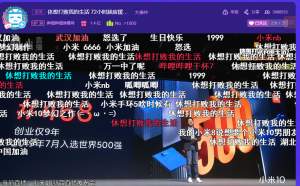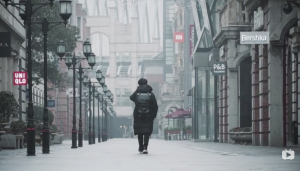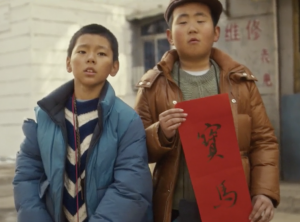
JD.com’s short film allows viewers to play the lead role
News From China
It’s been a slow news week in China, with the country on vacation for the week-long National Day holiday and the 70th anniversary of the PRC’s founding, but marketing efforts have been in full swing. Here’s a selection of some of the most buzz-worthy campaigns seen over this period:
- JD.com’s AI division collaborated with People’s Daily to produce a mini-movie, “70 Years, I Am the Protagonist” (70年,我是主角), along with a “face-changing” game that allowed players to assume the lead role.
- Tencent News developed a hugely popular narrative WeChat mini-program and created national flag stickers that users could add to their profile images.
- China Southern Airlines offered a dramatic short film based on the true story of one of its planes that was grounded in Istanbul during the attempted military coup in 2016. Passengers were told that as long as they stayed on the plane, they would be protected as if on Chinese territory.
- Gaode Navigation added an audio tour guide feature to its app, and collaborated with the Palace Museum, Confucius Temple, and other historic attractions to help tourists during the busy travel period.
- Mattress firm DeRucci hosted a Max Richter “Sleep” concert on the Great Wall, with mattresses instead of seats, and tickets distributed via social media giveaways.
Brands are especially keen to reach the rising consumers of China’s Gen Z, the 260-million strong demographic born in the years after 1995. This report looks at some of their preferences that brands should keep in mind when developing holiday campaigns that appeal to this group:
- This consumer group no longer worships foreign brands and values domestic products that tap into national pride.
- While their incomes levels are relatively low, they are willing to pay moderate prices for quality goods.
- They are happy to spend on content and other services that satisfy desires for learning and self-realization.
- “Lazy” home culture is prevalent, fueling demand for e-commerce and online services.
- They are less interested in logos to signify luxury and are more interested in customization.
The even younger generation, known as “post-00” in China, are mobile internet natives with a target attention span of 15 seconds, according to this report, with nearly three-quarters of this group using short-video app Douyin. The report outlines a few other considerations relevant to brands:
- They seek to find information quickly by swiping, and can tolerate a high density of information.
- Short video apps (such as Douyin and Kuaishou) and vlog platforms appeal to this generation’s desire to show themselves off, and brands can best reach them by offering opportunities for interaction, both online and offline.
- Key Opinion Consumers (KOCs, aka micro-influencers) can be more important than Key Opinion Leaders (KOLs/influencers) for younger consumers, who are more likely to be persuaded by the recommendations and behavior of their peers and acquaintances rather than social media celebrities.
- On short video apps, branded AR stickers have been an effective marketing tool, as users enjoy transforming their appearances before the camera.
McDonald’s may be the only brand with an on-screen presence in the Dreamworks Animation-Pearl Studio co-production Abominable, and the fast-food giant is promoting its collaboration with the film in China through new menu items that include Angus-pineapple-bacon cheeseburgers and blueberry-cream cheese pies, as well as offering long-haired yeti figures for purchase.
iQiyi’s hit romantic drama “My Mowgli Boy” (我的莫格利男孩) illustrates the range of opportunities for brand integration available on the platform. The streaming service seeks to help brands reach consumers by recommending programs in specific categories that target different user groups. Within dramas, it offers a variety of marketing products beyond traditional product placement, such as branded vlogs, ads that can be updated and refreshed, and banners that correspond to the content of the show.
News in English
- The protests in Hong Kong continue to be a flashpoint for overseas brands. The NBA, arguably China’s most popular sports brand, has found itself in the precarious position of condemning a Tweet by the Houston Rockets’ general manager that expressed support for the protestors, while broadcasts of the team’s games have been cancelled by both state broadcaster CCTV and longtime exclusive streaming partner Tencent. The Wall Street Journal
- Vans is also facing a social media backlash outside of mainland China for pulling a leading entry out of a creative sneaker design contest. The design in question featured imagery associated with the Hong Kong democracy movement, such as yellow umbrellas and crowds in face masks and hard hats. Highsnobiety
- Tiffany’s is one of many high-end brands turning to art world associations to boost its name in China, with a new exhibition of 300 pieces spanning its 182-year history on display at the Fosun Art Foundation in Shanghai, including a never-before-seen photo of Audrey Hepburn on the set of “Breakfast at Tiffany’s.” The company is seeking to boost its presence in mainland China as its Hong Kong business has suffered due to the protests, and also took the precautionary step of deleting a Tweet with an ad image that was interpreted by some as supporting the protestors. Artnet, Inkstone
- Meanwhile, TikTok restated its position political ads are banned in order to maintain a “positive, refreshing environment.” The Chinese-owned short video app has been under scrutiny recently for its restrictions on potentially controversial non-ad content on topics such as the Hong Kong protests and LGBTQ rights. Techcrunch
- Brands working with Chinese influencers on platforms such as Douyin and Tmall should understand the importance of timely interaction between their representatives and followers. The top 10 brands on Douyin are reported to receive 70% of all brand account likes, and engagement is often what sets them apart. The Drum
- Sprite has teamed up with the inexpensive liquor brand Jiangxiaobai to launch two new products for the Chinese market: a non-alcoholic baijiu-flavored Sprite and an alcoholic ready-to-drink Jiangxiaobai soda in a lemon-lime flavor. The marketing campaign for the new drinks targeted younger consumers with a challenge to “mix it up like this” on social media, and generated 69 million short videos on Douyin. Branding in Asia
We’ve Got China Covered






